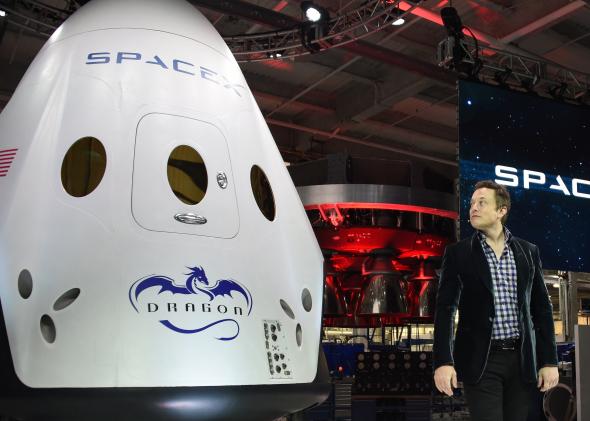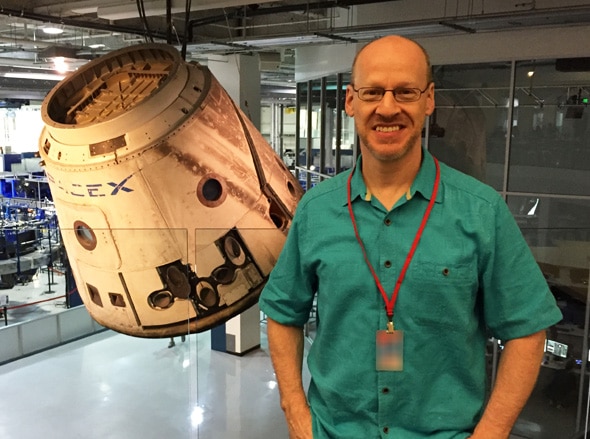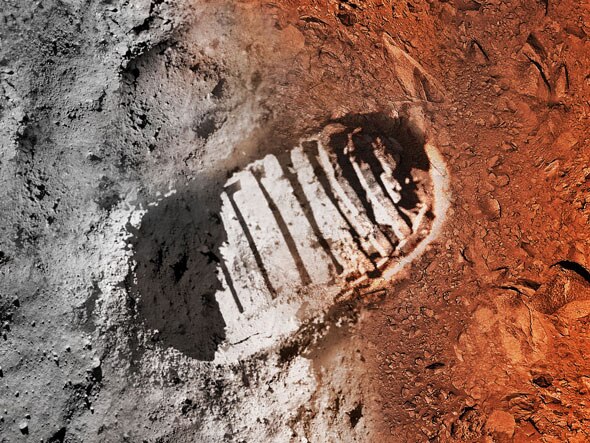Create a free profile to get unlimited access to exclusive videos, sweepstakes, and more!
To Mars

Why is Elon Musk so hell-bent on going to Mars?
There are two answers to this. One is the actual answer. The other isn't exactly wrong—it’s technically correct—but it’s incidental. And it turns out that’s not even really the right question.
Bear with me a moment. You need a little background.
I’ve been interested in SpaceX for a while now. Years ago, when Musk announced he was going to launch the first privately funded liquid-fuel rocket into orbit, I figured he might be able do it—it’s a daunting but not impossible task. Still, I was pretty skeptical. But he did have a bit of a leg up: He’d been pouring money into SpaceX, a personal fortune made from running earlier companies like PayPal and X.com (and now SolarCity and Tesla).
It takes more than money, of course, to build a successful rocket program. But my doubts were lessened considerably in September 2008, when, after three previous rockets had failed to achieve their mission goals, a Falcon 1 rocket reached orbit around the Earth. Now, years later, with the Falcon 9 proving to be a reliable vehicle and several successful launches to the International Space Station and beyond under its belt, SpaceX has shown it can look even farther.
This was all on my mind when I got a chance recently to take a tour of the SpaceX construction factory and corporate HQ in Hawthorne, California. I had been invited by Musk, who, to my surprise, follows me on Twitter and reads this blog. (Full disclosure: SpaceX paid for the trip.) I was excited by the prospect—duh—and the place did not disappoint.
As I walked in, for a brief moment it felt more like a company office than a factory. But after a short walk from the front door and past the lobby it’s like, seriously, the scene in Willy Wonka when everyone steps off the elevator into the chocolate factory.
Hanging from the high ceiling is the actual first Dragon capsule to be sent into orbit, scorch marks from its atmospheric re-entry licking up the sides. Nearby, two other capsules are in various stages of construction. A half dozen Merlin engines are lined up, already tested once under fire, now being retooled and checked out for their next launch. Two enormous Falcon 9 boosters lie side by side in one corner of the factory. From the café on the mezzanine I can see twin enormous nose cones sitting in the next room, waiting to be used on the demo flight of the Falcon Heavy, a huge rocket that is the next generation of SpaceX boosters. And all this is open, on the floor, available to be gawked at.
During the tour I also saw dozens of people working on the various components of the Falcons 9 and Heavy. It was hard not to notice that they all seemed to be in pretty good spirits—smiling, laughing, talking, gesticulating. Looking around, that wasn’t too surprising. A sense of pride and excitement would be natural working in such a place. But there was something else, too, that I couldn’t quite put my finger on.
Before the thought could crystallize, the tour was over. I was brought over to the admin section of the factory to meet with Musk. I’ll spare you the personal details; you can find those all over the Web. What impressed me the most was his matter-of-fact attitude; not surprisingly he is a man who knows what he wants and how to achieve it. With his track record, he’s earned that confidence.
We talked about various topics for a while—the movie Interstellar, the history of SpaceX, terraforming Mars … and that was when I said something dumb.
“I know Mars is a long-term goal for SpaceX,” I started. Then, pretty much as an aside, I said, “because you want to retire on Mars …”
Musk got a pained look on his face. “No, that’s wrong. That’s not why I want to get to Mars. That quote is from an article in the Guardian. They pushed me for a sound bite, asking if I wanted to retire on Mars. I eventually said yes. When I retire—hopefully before I go senile—and eventually die, then Mars is as good a place to die as any.”
That line made me laugh; it’s far better than anything printed in the Guardian article.
But still, I was taken aback. “OK then, the article wanted a sexy quote and got one. But if that’s not the reason, what is it?”
Musk didn’t hesitate. “Humans need to be a multiplanet species,” he replied.
And pretty much at that moment my thinking reorganized itself. He didn’t need to explain his reasoning; I agree with that statement, and I’ve written about it many times. Exploration has its own varied rewards ... and a single global catastrophe could wipe us out. Space travel is a means to mitigate that, and setting up colonies elsewhere is a good bet. As Konstantin Tsiolkovsky (the father of modern rocketry) said, “The Earth is the cradle of humanity, but one cannot live in the cradle forever.”
So I hardly needed to mull that over. But what did happen is that two things became clear in my head simultaneously. One was that Musk’s answer was simply stated, plainly obvious to him, but to the public it’s not. It seems like science fiction.
But with his immense factory sitting directly behind me, there was no doubting this was not the wild dream of a sci-fi fan. This is reality. The dichotomy between public perception and what was really happening here was never clearer to me.
The second was the crystallization of what had been nagging me during the tour.
The overall atmosphere in the factory was one of working at a progressive company on an exciting project. Of course: They build rockets. But the feeling I couldn’t put my finger on before suddenly came into focus. The attitude of the people I saw wasn’t just a general pride, as strong as it was, in doing something cool. It was that they were doing something important. And again, not just important in some vague, general way, but critical and quite specific in its endgame: making humans citizens of more than one world. A multiplanet species.
It’s easy to dismiss this statement, think of some snark as a way to minimize it and marginalize it as the thinking of a true believer. But—skeptic that I am—I’ve come to realize this is not minimal. It is not marginal. This is a real, tangible goal, one that is achievable. And SpaceX is making great strides toward achieving it.
That’s when I also realized that the initial question itself was ill-posed. It’s not why Elon Musk wants to get to Mars. It’s why he wants humanity to get there.
I think that's a pretty good idea.
Days later, back home in Colorado, I went out on my porch just after sunset and took a look at the sky to the west. Venus was shining like a beacon, brilliant and beguiling. Just below it, close in the sky but much farther away in reality, was Mars, a duller red in color and far fainter. But of the two, my gaze kept returning to Mars.
How long before we go there? Is the first human to make their bootprint in the ochre dust already leaving footprints here on Earth?
I suspect so. And it may not be all that long before they’re on their way.
Postscript: There’s been some discussion lately among space and science communicators about the way we talk about space exploration and how it relates to different cultures (for example, DNLee has thoughts on this). This took place, coincidentally, around the same time I wrote this article, and it’s an interesting line of discussion, one I’m mulling it over. I’ll have more to say about this in the near future, I think.




























